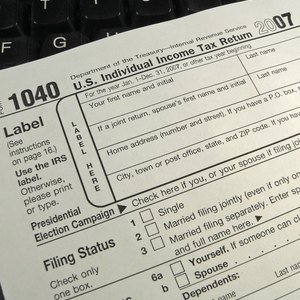
Federal law imposes deadlines for the Internal Revenue Service (IRS) to begin their collection efforts to collect overdue taxes. These deadlines, known as “statutes of limitations,” are time periods the IRS has to begin collection efforts or forgo collecting tax liabilities from individual taxpayers. By federal law, taxpayers must file their tax returns if they are required to file returns for that tax year. The requirements vary upon an individual's income amounts and filing status.
General Statute of LImitations
According to federal law, the IRS may collect outstanding tax liabilities from individual taxpayers for up to 10 years from the time the tax liability was imposed. In other words, the IRS may seek overdue taxes from taxpayers who file their tax returns and underpay their assessed liability for up to 10 years. However, the federal government provides the IRS with an exception to this general rule in cases where individuals do not file tax returns.
Exception to 10-Year Statute of Limitations
There is no deadline for the IRS to collect outstanding taxes if a taxpayer fails to file a required tax return for the tax year. Applicable statute of limitations periods begin when the taxpayer files the return. However, in situations where the taxpayer does not file a return, the IRS’ statute of limitations clock never begins to start ticking.
Reasons to File
Instructions for IRS Form 1040 address specific situations in which taxpayers may not have to file an income tax return for the specific tax year. Generally, most taxpayers should file a Form 1040 tax return to avoid being liable for overdue or late tax payments even if taxpayers are not legally required to file because of the legal and tax implications for failing to file.
Failure to File Implications
Taxpayers who do not file a required federal income tax return can be held criminally or civilly liable for failing to file a mandatory tax return. Taxpayers may also forgo refunds for that year, lose earned credits or owe monetary penalties for failure to file. The IRS can impose interest on the overdue amounts from the date the taxes were due and may impose additional penalties based upon any interest amounts. The IRS can also file a substitute tax return for any taxpayer who fails to file.
IRS Statute of Limitations Suspension Rules
In addition to the exception for taxpayers who fail to file mandatory returns, the IRS has certain rules that are used to suspend the statute of limitations or deadline to collect rules. The IRS can suspend the time period when the taxpayer has filed for bankruptcy. Federal laws provide temporary “stays” whereby collection efforts cease temporarily from any potential creditors including the IRS. The IRS can add another six months to the time period. There are temporary cessation rules in cases when the taxpayer resides outside of the U.S., is unavailable or considered absent. There are other circumstances that may extend the time period for collection, including “Innocent Spouse” relief situations and circumstances where the taxpayer is negotiating a tax compromise with the IRS.
References
Writer Bio
Jill Stimson has worked in various property management positions in Maryland and Delaware. Stimson worked for the top three property management companies in the commercial industry and focuses her career on property building logistics and tenant relationships. She holds a Juris Doctor and a Bachelor of Science in psychology.

